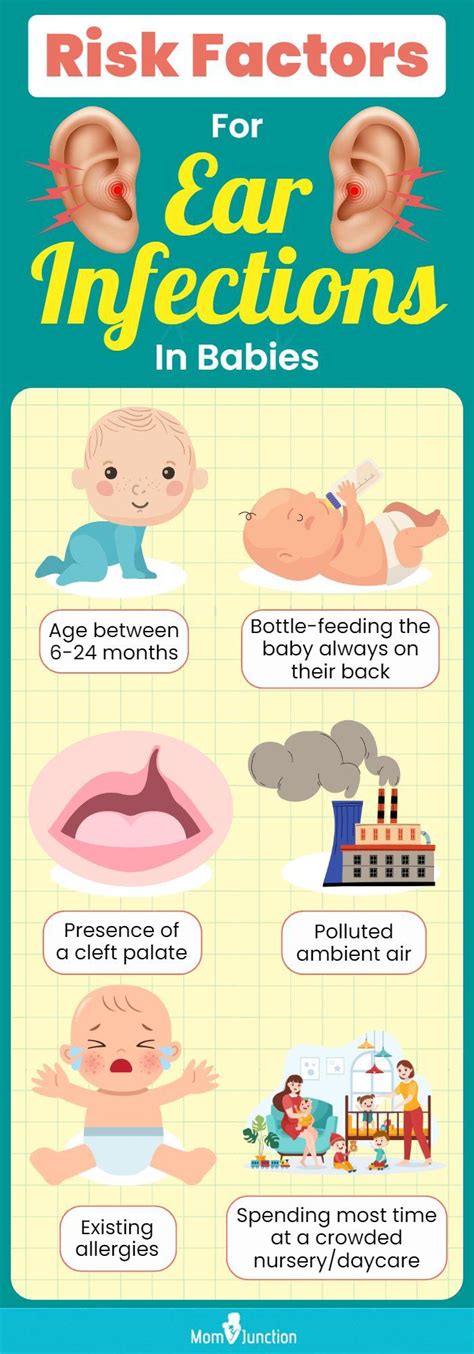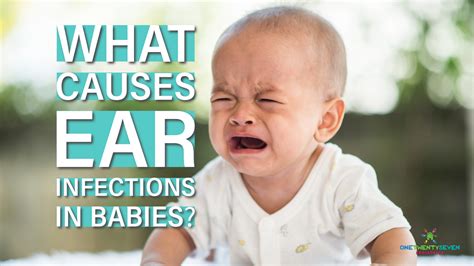Intro
Identify 5 infant ear infection symptoms, including fever, crying, and tugging at ears, to recognize signs of otitis media, ear pain, and hearing loss in babies, and learn when to seek medical attention for effective treatment and prevention of complications.
Infant ear infections are a common health issue affecting many young children. These infections occur when bacteria or viruses infect the middle ear, causing inflammation and fluid buildup. It's essential for parents and caregivers to recognize the symptoms of infant ear infections to provide timely medical attention and prevent potential complications. In this article, we will delve into the world of infant ear infections, exploring their causes, symptoms, and treatment options.
Ear infections in infants can be distressing for both the child and the parents. The symptoms can be subtle, making it crucial to be aware of the signs to seek medical help promptly. Infant ear infections can lead to discomfort, pain, and even temporary hearing loss if left untreated. Therefore, it's vital to understand the symptoms and take proactive steps to prevent and manage these infections.
The importance of recognizing infant ear infection symptoms cannot be overstated. Early detection and treatment can significantly reduce the risk of complications, such as hearing loss, speech delays, and eardrum damage. Moreover, understanding the causes and risk factors of ear infections can help parents take preventive measures, reducing the likelihood of their infant developing an ear infection. By being informed and vigilant, parents can ensure their child receives the best possible care and attention.
Introduction to Infant Ear Infections

Causes and Risk Factors
The causes of infant ear infections are multifaceted, involving a combination of anatomical, environmental, and genetic factors. Infants are more prone to ear infections due to their shorter Eustachian tube, which makes it easier for bacteria and viruses to enter the middle ear. Additionally, infants' immune systems are still developing, making them more susceptible to infections. Other risk factors include exposure to cigarette smoke, attending daycare, and having a family history of ear infections.Common Symptoms of Infant Ear Infections

Treatment Options for Infant Ear Infections
Treatment for infant ear infections depends on the severity of the infection and the child's age. Mild ear infections may resolve on their own with watchful waiting, while more severe infections may require antibiotic treatment. In some cases, ear tubes may be inserted to drain the fluid and reduce pressure in the middle ear. It's essential to consult with a pediatrician to determine the best course of treatment for the infant.Prevention and Management

Complications of Untreated Ear Infections
Untreated ear infections can lead to complications, such as hearing loss, speech delays, and eardrum damage. It's essential to seek medical attention if symptoms persist or worsen over time. Early detection and treatment can significantly reduce the risk of complications and ensure the best possible outcome for the infant.Conclusion and Next Steps

We hope this article has provided you with valuable insights into infant ear infections. If you have any questions or concerns, please don't hesitate to reach out. Share this article with friends and family to help spread awareness about the importance of recognizing infant ear infection symptoms.
What are the most common causes of infant ear infections?
+Infant ear infections are commonly caused by bacteria or viruses that infect the middle ear. Anatomical factors, such as a shorter Eustachian tube, and environmental factors, such as exposure to cigarette smoke, can also contribute to the development of ear infections.
How can I prevent my infant from getting an ear infection?
+While it's not possible to completely prevent infant ear infections, you can reduce the risk by breastfeeding, avoiding exposure to cigarette smoke, practicing good hygiene, and getting your infant vaccinated.
What are the potential complications of untreated ear infections in infants?
+Untreated ear infections can lead to complications, such as hearing loss, speech delays, and eardrum damage. It's essential to seek medical attention if symptoms persist or worsen over time to prevent these complications.

